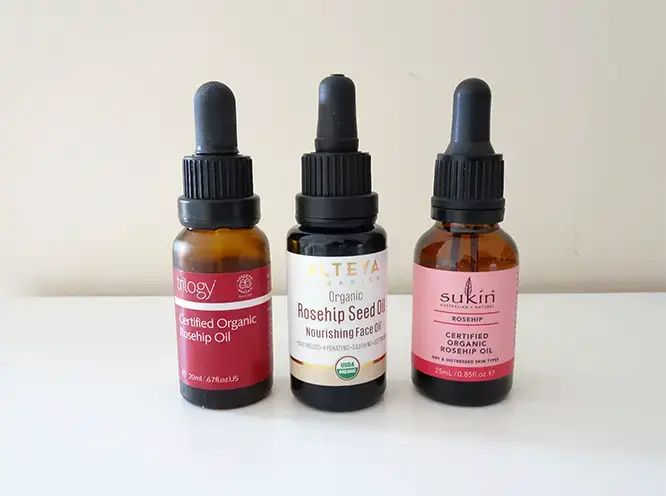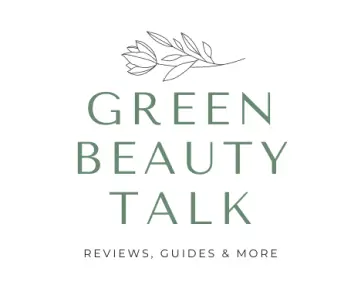Many people wonder if rosehip oil can help with stretch marks. I’ve used rosehip oil myself and seen some good changes. In this article, we’ll look at whether rosehip oil really helps with stretch marks. This includes new ones, old ones, and those from pregnancy. People say rosehip oil is great for the skin, so let’s find out how well it works for stretch marks.

Understanding Rosehip Oil and Stretch Marks
What is Rosehip Oil?
Rosehip oil, also known as rosehip seed oil, is derived from the seeds of rose bushes. This oil is distinct from rose oil, which is extracted from rose petals.
Rich in essential nutrients beneficial for the skin, rosehip oil contains vitamins E and D, B-carotene (a form of vitamin A), and essential fatty acids like omega-3 and omega-6.
Unlike some other plant oils, it has very little, if any, vitamin C. These components make rosehip oil highly valued for its potential to nourish and rejuvenate the skin.
The Science Behind Stretch Marks
Stretch marks are kind of like scars that show up when your skin stretches or shrinks quickly. Imagine your skin is like elastic – if it’s stretched or shrunk too fast, it can’t keep up, and that’s when stretch marks happen.
They’re really common, especially if you’re pregnant, growing fast as a teen, or if your weight changes a lot.
Hormones can play a part too. Some people might get them because their family members do, but really, anyone can get stretch marks. At first, they might look red or purple, but over time they fade to a lighter color.
Does Rosehip Oil Really Help with Stretch Marks?
Rosehip oil has been a topic of interest for its potential benefits in treating stretch marks, which are a type of scar. Here’s what we know, what the studies say, and what remains uncertain:
Rosehip Oil Benefits for Stretch Marks
The Nutrient-Rich Profile of Rosehip Oil: Rosehip oil is packed with vitamins, antioxidants, and essential fatty acids. These nutrients are known for their skin-nourishing properties, which can be particularly helpful in improving the appearance of stretch marks. The oil is rich in vitamins A and E, along with omega-3 and omega-6 fatty acids. It may also contain some vitamin C. These components are key in supporting skin regeneration and hydration.
Potential Effectiveness on New Stretch Marks: New stretch marks may respond better to rosehip oil treatment. The theory is that the fresher the scar, the more receptive it might be to healing interventions. Rosehip oil’s nourishing properties could potentially help these newer marks fade more quickly.
Impact on Older Stretch Marks: Older stretch marks can be more challenging to treat. However, consistent use of rosehip oil might aid in reducing their visibility. The oil’s nutrients could help improve the skin’s overall appearance, making older stretch marks less pronounced.
The Effectiveness of Rosehip Oil on Stretch Marks: What Research Tells Us
Rosehip oil and Scars:
While direct studies on rosehip oil and stretch marks are limited, research on its effect on scars offers relevant insights. For instance, a study published in the Journal of Cosmetics, Dermatological Sciences and Applications demonstrated the positive impact of rosehip oil on post-surgical scars. This suggests potential benefits for stretch marks, given their similarity to scars.
Rosehip Oil in Preventing Stretch Marks:
A pivotal study in the International Journal of Cosmetic Science focused on rosehip oil’s role in preventing striae gravidarum, or stretch marks during pregnancy. The study examined a cream containing rosehip oil and found it effective in preventing the development of stretch marks. This direct evidence of rosehip oil’s potential benefits in stretch mark treatment, especially during periods of significant skin stretching like pregnancy, is especially encouraging.
Conclusion
These studies collectively highlight the potential of rosehip oil in promoting skin health and its possible effectiveness in treating and preventing stretch marks. While more research is needed for a comprehensive understanding, the current evidence presents a positive outlook for rosehip oil as a natural remedy in skin care, particularly for stretch marks.
Rosehip Oil for Stretch Marks During Pregnancy
Safety and Benefits: Using rosehip oil during pregnancy for stretch marks has become increasingly popular due to its natural composition and skin-nourishing properties. It’s generally considered safe for use during pregnancy, a time when many women are cautious about the products they apply to their skin.
Rosehip oil is valued for its ability to hydrate and support skin elasticity, which can be particularly beneficial as the skin stretches during pregnancy. Its rich content of vitamins A and E, along with essential fatty acids, helps in maintaining skin health and may aid in preventing the formation of new stretch marks.
Precautions: While rosehip oil is generally safe, it’s always important to patch test any new skincare product during pregnancy. This is due to the skin sometimes being more sensitive during this period. Apply a small amount of oil to a discreet area and wait 24-48 hours to ensure there’s no adverse reaction.
Application on Pregnant Belly: Applying rosehip oil to the belly can be soothing and may help in maintaining skin hydration and elasticity. To use, gently massage a few drops of the oil into the skin of the belly, focusing on areas prone to stretching. This can be done as part of a daily skincare routine, preferably after a shower when the skin is more receptive to absorbing the oil.
Summary: Rosehip oil presents a promising, natural option for managing skin health during pregnancy. Its hydrating and elasticity-supporting properties make it a suitable choice for expectant mothers looking to minimize stretch marks. However, it’s important to remember that individual results may vary, and it’s always recommended to consult with a healthcare provider before introducing any new product during pregnancy.
How to Use Rosehip Oil for Stretch Marks
- Start with Clean Skin: Before applying rosehip oil, make sure your skin is clean. This helps the oil absorb better.
- Warm the Oil: Pour a few drops of rosehip oil into your palms and gently rub your hands together. This warms the oil, making it easier to apply.
- Gentle Application: Apply the oil to areas with stretch marks. Use your fingertips to gently massage the oil into your skin in a circular motion. This helps increase blood flow to the area.
- Consistency is Key: For the best results, apply rosehip oil at least once a day, ideally twice. Consistent use is important for seeing changes.
Best Times and Methods:
- After Showering: Applying rosehip oil after a shower or bath is ideal because your pores are open, which helps the skin absorb the oil better.
- Before Bed: Using rosehip oil before bed allows it to work overnight. Your skin naturally repairs itself while you sleep, so this can enhance the oil’s effects.
Rosehip Oil in Routine Skincare
Incorporating Rosehip Oil:
- As a Moisturizer: You can use rosehip oil as a part of your regular skincare routine, either in the morning or at night. If your skin is dry, it can be used as a moisturizer.
- With Other Products: Rosehip oil can also be mixed with your favorite cream or lotion for an extra boost of hydration.
Complementary Skincare Practices:
- Stay Hydrated: Drinking plenty of water is crucial for healthy skin. Hydration helps maintain skin elasticity, which can reduce the appearance of stretch marks.
- Balanced Diet: Eating a balanced diet rich in vitamins and minerals supports skin health from the inside.
- Gentle Exfoliation: Occasionally exfoliating the areas where you have stretch marks can remove dead skin cells and improve oil absorption.
Choosing the Best Rosehip Oil for Stretch Marks
When selecting a rosehip oil for stretch marks, there are key qualities to look for that indicate a high-quality product:
Purity:
- 100% Pure: Ensure the oil is 100% pure rosehip oil without added ingredients or fillers.
- Organic Certification: Organic oils are less likely to contain pesticides or chemicals.
Extraction Methods:
- Cold-Pressed: This method preserves the oil’s natural nutrients as it doesn’t involve heat or chemical extraction.
- Unrefined: Unrefined rosehip oil retains more of its natural benefits compared to refined oils.
Color and Smell:
- Color: High-quality rosehip oil typically has a deep golden or reddish hue.
- Fragrance: Pure rosehip oil should have a subtle, earthy smell.
Top Recommended Rosehip Oils
- Trilogy Certified Organic Rosehip Oil: Widely praised for its purity and effectiveness. It is certified organic, cold-pressed, and known for improving skin tone and texture.
- Sukin Certified Organic Rosehip Oil: Another popular choice, this oil is also organic and cold-pressed. Users often report it being helpful for hydrating skin and reducing the appearance of scars and stretch marks.
- Pai Rosehip BioRegenerate Oil: Notable for its potent blend of rosehip seed extract and rosehip fruit extract, offering a high concentration of active ingredients.
When choosing a rosehip oil, it’s important to consider your skin type and preferences in texture and fragrance. Remember, what works for one person may not work for another, so it may take some experimentation to find the perfect fit for your skin needs.
Conclusion
Rosehip oil could be a valuable addition to your skincare routine, especially if you’re dealing with stretch marks. It’s natural, generally safe, and known for its skin-nourishing properties. While individual results may vary, the potential benefits it offers make it worth trying. As always, it’s recommended to do a patch test first and consult with a healthcare provider if you have any concerns, especially during pregnancy. With its nourishing qualities and positive reviews, rosehip oil might just be the natural remedy you’ve been looking for.

Petra Nakashian (previously Kravos) is a dedicated natural health and beauty blogger, driven by the loss of her parents to cancer, which led her to meticulously research beauty product ingredients. With over 10 years of experience, her in-depth knowledge has made her a trusted expert in the field. Founder of Be Healthy Now and Green Beauty Talk, Petra recently expanded her expertise with Beauty Insights Hub, exploring a wider range of beauty treatments. Committed to transparency and honesty, her work is a vital resource for navigating the complex world of beauty.

